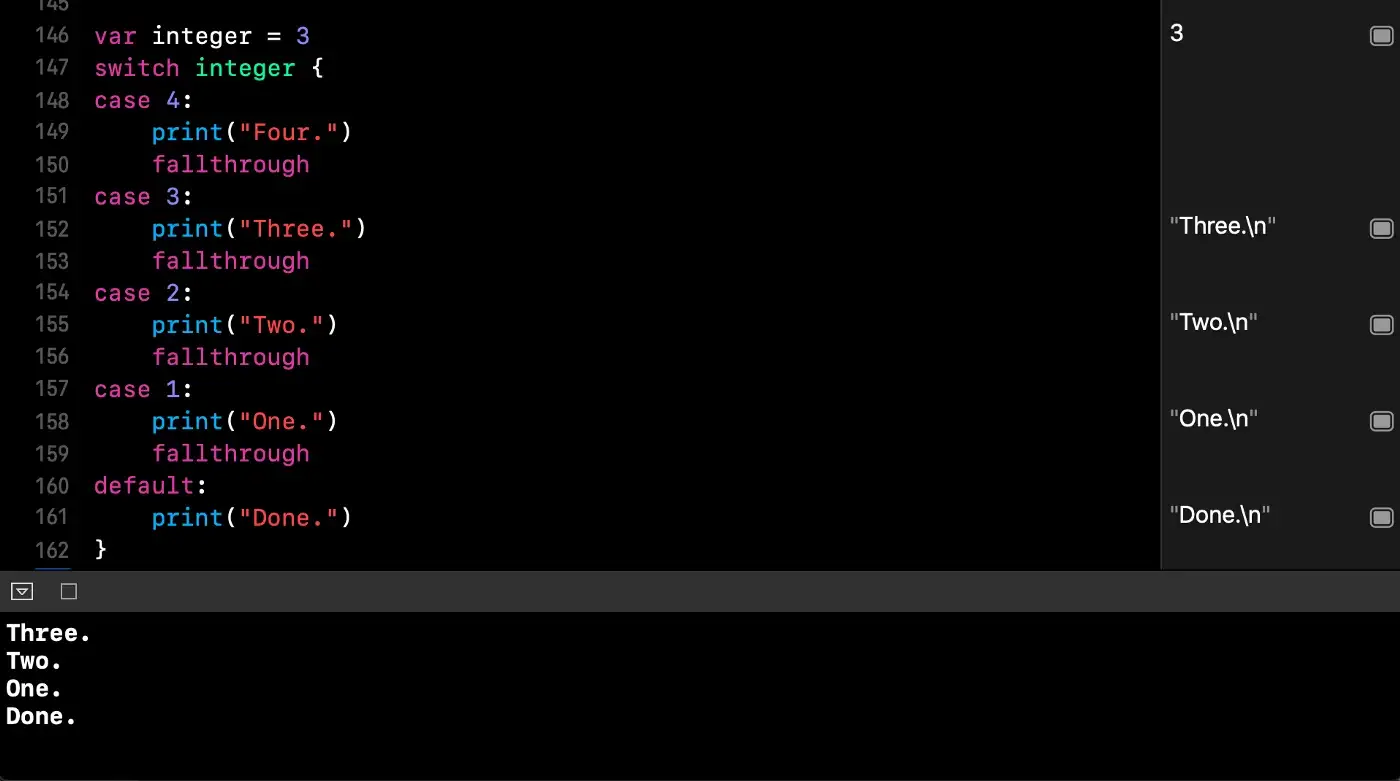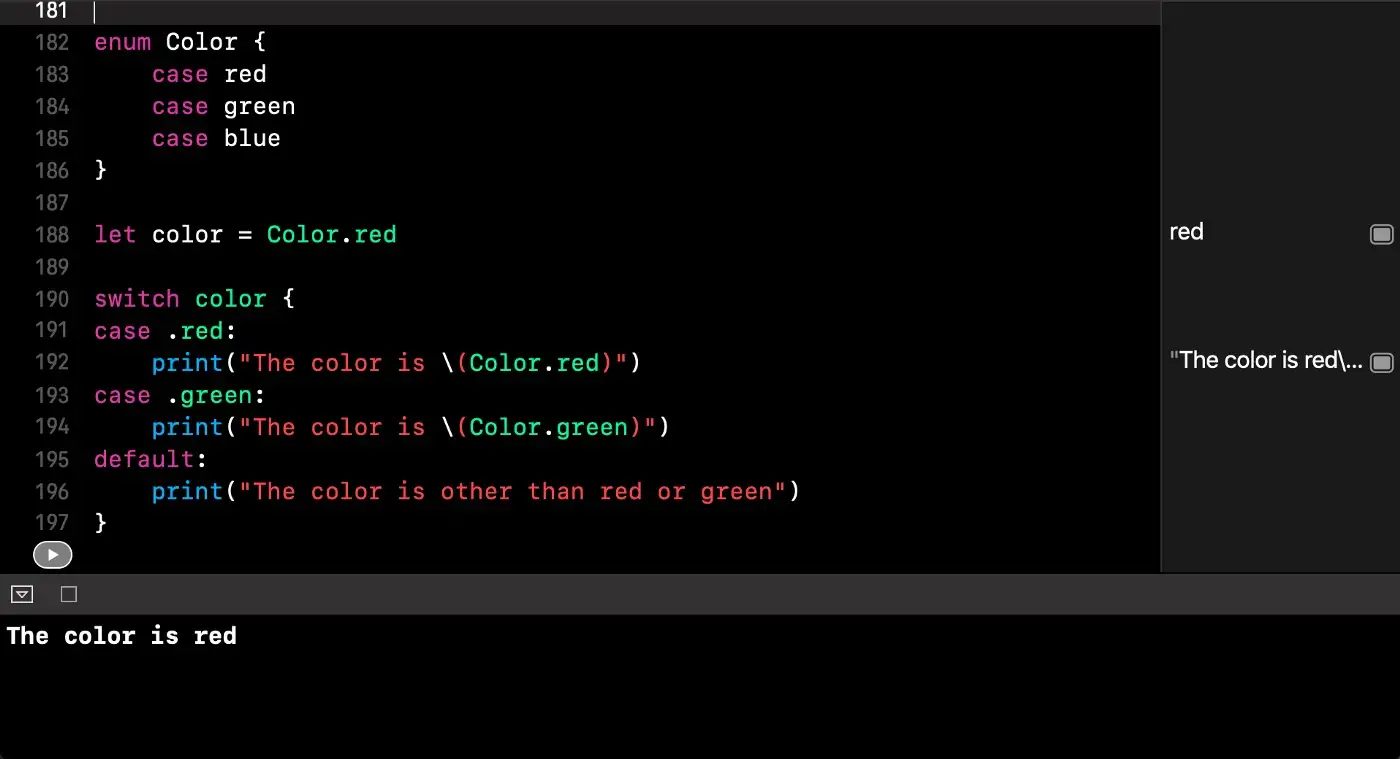fallthrough and unknown default in Swift
Swift has many great features, people who worked with Objective-C for a long time will agree with this point I believe.
One of them in Swift Control Flow is Fallthrough
A switch statement in Swift completes its execution as soon as the first matching case is completed.
It will not go up to the bottom of other cases as it happens in C and C++ programming languages.
The generic syntax of a switch statement in C and C++ is as follows:
switch(expression) {
case constant-expression:
statement(s);
break; // optional
case constant-expression:
statement(s);
break; // optional
// you can have any number of case statement
default: // Optional
statement(s);
}Syntax of a Switch Statement
Here we need to use a break statement to come out of a case statement, otherwise, the execution control will fall through the subsequent case statements available below the matching case statement.
The generic syntax of a switch statement in Swift is as follows:
switch expression {
case expression1:
statement(s)
fallthrough // optional
case expression2, expression3: // we can use , to use same implementation for more than one case
statement(s)
fallthrough // optional
default: // optional
statement(s);
}Generic Syntax of a Switch Statement
If we do not use fallthrough, then the program will come out of the switch statement after executing the matching case.
For example:
var integer = 3
switch integer {
case 4:
print("Four.")
fallthrough
case 3:
print("Three.")
fallthrough
case 2:
print("Two.")
fallthrough
case 1:
print("One.")
fallthrough
default:
print("Done.")
}fallthrough example code
In this example, case 3: matched with the integer value and will execute the corresponding statement. Since it has fallthrough in it. It will move to the next case and execute those statements too. Then the same rules applied if that statement also has fallthrough in it.
The output looks like this:

Fallthrough playground
The fallthrough keyword does not check the case conditions for the switch the case that it causes execution to fall into. The fallthrough keyword simply causes code execution to move directly to the statements inside the next case (or default case) block, as in C’s standard switch statement behaviour.
Another feature I liked in the latest version of Swift is @unknown default
When we use switch over an enum, we will need to do so exhaustively that means add a switch case for every case in the enumeration, if not we need to add a default case

Switch Default case
Now if we need to add a case to an enum in the future, which is a code-breaking change for any switch that uses that enum.
This is particularly cumbersome for code from libraries, SDKs and frameworks because every time when adding a new case to an enum it’s breaking someone else’s code. Moreover, a code-breaking change negatively affects that binary compatibility.
To avoid all these issues, Swift 5.0 a new @unknown keyword can be added to the default switch case. This doesn’t change the behaviour of default, so this case will still match any cases that aren’t handled in the rest of the switch block.
For example, we were switching between user notification authorization statuses. This would’ve worked fine in Swift 4.2, but now triggers a warning.
switch userNotificationsAuthorizationStatus {
case .notDetermined:
requestPermission()
case .authorized, .denied, .provisional:
// No need to request permission.
print("Didn't request permission for User Notifications")
}Switch behaviour before Swift 5

Switch @unknown default Case
Therefore, we can use a combination of the fallthrough keyword together with the new @unknown keyword.
switch userNotificationsAuthorizationStatus {
case .notDetermined:
requestPermission()
case .authorized, .denied, .provisional:
fallthrough
@unknown default:
// No need to request permission.
print("Didn't request permission for User Notifications")
}@unknown default in Switch
Let us understand the difference between default and @unknown default
In the below code example, I didn’t cover the authorized enum case. Without @unknown, we’re not warned with any error and compiler just handles the case as a catch all.
With @unknown, we’re warned that we didn’t handle the authorized case:

Error about the missing case when using @unknown default
With default, we’re not warned that we didn’t handle the authorized case, we might miss implementing a case & there is no compiler feedback about it:

No Error about the missing case when using default
This is a free third party commenting service we are using for you, which needs you to sign in to post a comment, but the good bit is you can stay anonymous while commenting.

